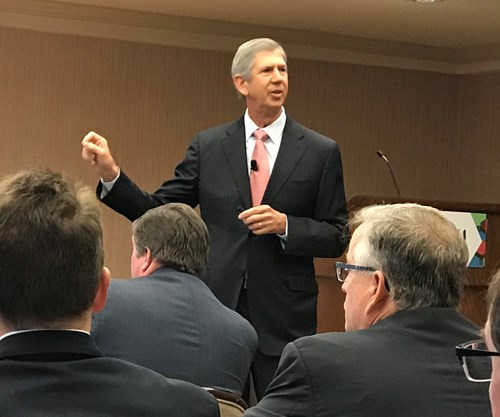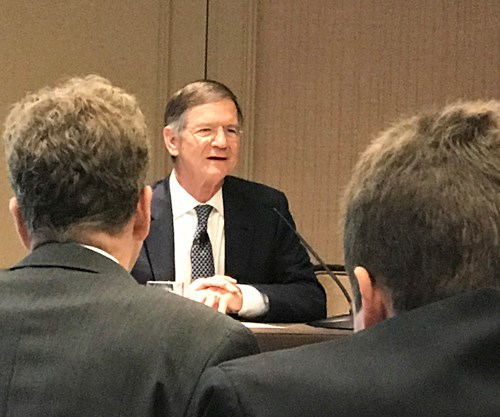Reading the Trump tea leaves
The art and science of determining what the President-elect and the new US Congress might or might not do, and when they might or might not do it, and how it might or might not affect the composites industry.

Cal Dooley, president and CEO of the American Chemistry Council, speaking at ACMA's 2017 Composites Executive Conference in Washington, DC.
I am in Washington, DC, this week attending the ACMA Composites Executive Forum, where, not surprisingly, there was much speculation among the speakers about what President-elect Donald Trump and the new US Congress has in store for the United States.
There is a fair amount of uncertainty surrounding this question, particularly given the non-specific nature of some of Trump's policy positions during the General Election campaign. And that uncertainty expressed itself today at the conference in the form of broad speculation by speakers about what Trump might do, and how it might affect the composites industry.
Today's speakers represented a variety of interests, ranging from the American Chemistry Council to a bipartisan consultantcy to the US House of Representatives. Many of the speakers speculated about what might happen, with heavy emphasis on trade policy, tax policy, infrastructure, regulations and healthcare.
The person who spoke most directly and specifically about what might happen was Lamar Smith, a Republican Congressman from Texas' 21st District. He said Trump and Congress will assess and roll back many regulations, particularly those deemed overly burdensome, unnecessary or unsupported by sound science. Further, he said Congress likely will pass a bill requiring that all regulations include the data that supported their creation. Smith admitted that "we all want clean air and clean water, but regulations should be justified and beneficial, not unnecessarily burdensome." Congress, said Smith, is also working on tax code reform, aiming to make it simpler and more business-friendly. He said to expect the number of tax brackets to be reduced from seven to three, and expect incentives to encourage companies to stay in the US. Smith also said that replacing the Affordable Care Act (Obamacare) will take about a year, and that the new system will focus on expanded use of private insurers and interstate competition, which, he said, will provide greater choice for the consumer, at lower cost. He also said the stipulation under ACA that a person cannot be denied coverage due to pre-existing condition will remain in place.

Congressman Lamar Smith, Republican from the Texas 21st.
Cal Dooley, president and CEO of the American Chemistry Council (ACC) made many friends in the audience when he said, "We think there is going to be an infrastructure build in the new administration, and if there is, we want an open materials competition." That is, ACC wants non-legacy materials, such as composites, to be given a chance to compete with legacy materials, such as concrete and wood. "This is a white hat issue for us," he said. "This makes us look like heroes." Dooley also talked at length about the value of cheap natural gas in the United States, noting that 85% of chemicals in the US are made with natural gas-based feedstocks. This conveys a substantial competitive advantage, he said. He also talked a lot about the need for regulations based on sound science, not fear. Finally, Dooley expressed concern about Trump's rhetoric regarding trade restrictions or increased tariffs. "As a chemical industry, we want more trade, not less," he said.
Lauren Bazel, vice president of the Alpine Group, a bipartisan consultantcy, emphasized that the value of composites is relatively unknown among lawmakers, and that it's incumbent on all composites industry players to engage with their representatives and senators to help them better appreciate the industry. In particular, she suggests inviting lawmakers to visit plants, to see, touch and feel composite materials, and understand their value.
Economist Robert Fry looked at broader economic indicators for hints about what the future might hold, and did speculate briefly about Trump and the new Congress. In general, he favors regulatory reform, tax reform and energy policy reform. He is opposed, he said, to backing out of trade deals, increased tariffs, deportations, and vilification of China and Mexico. Commenting on the latter, he noted that the best way to stem illegal immigration from Mexico is to help the Mexican economy get better, not worse. Regarding global oil supply and demand, Fry asserted that the world might reach peak demand before it reaches peak supply.
The biggest open question facing the conference today was whether or not the new President and Congress would roll back CAFE requirements installed by President Obama. Further, if such requirements were rolled back, it's unknown what affect that might have on vehicle design, development, lightweighting and material use.
Read Next
Plant tour: Daher Shap’in TechCenter and composites production plant, Saint-Aignan-de-Grandlieu, France
Co-located R&D and production advance OOA thermosets, thermoplastics, welding, recycling and digital technologies for faster processing and certification of lighter, more sustainable composites.
Read More“Structured air” TPS safeguards composite structures
Powered by an 85% air/15% pure polyimide aerogel, Blueshift’s novel material system protects structures during transient thermal events from -200°C to beyond 2400°C for rockets, battery boxes and more.
Read MoreDeveloping bonded composite repair for ships, offshore units
Bureau Veritas and industry partners issue guidelines and pave the way for certification via StrengthBond Offshore project.
Read More











.jpg;maxWidth=300;quality=90)









